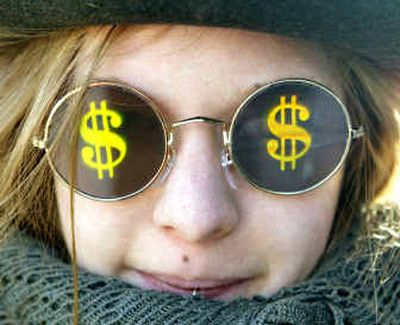Trade could battle terrorism, U.S. official says

DAVOS, Switzerland – President Bush’s second administration is committed to relaunching stalled world trade talks and the possibility of lifting some 300 million people out of poverty, a senior U.S. official said Saturday.
Outgoing U.S. trade representative Robert Zoellick told business and government leaders at the World Economic Forum that freer trade resulting from a new agreement could improve conditions in parts of the world and help eradicate breeding grounds for terrorism.
“We will continue to try to set an ambitious agenda” for the global economy, said Zoellick, who is to become the No. 2 man at the State Department.
In a separate discussion at the annual meeting in the Swiss ski resort Davos, Microsoft founder Bill Gates said he believes the dollar’s slide will continue.
“The dollar is going to go down, there’s no question,” Gates said.
The dollar’s decline has been a big worry for European leaders. A cheap dollar keeps U.S. tourists away from Europe and makes imports into the United States expensive.
The euro hit a record high of more than $1.36 at the end of December, though it has since fallen back. It traded at $1.30 Friday, up almost 9 percent in the past six months.
European leaders, including German Economics Minister Wolfgang Clement, have taken the United States to task over its ballooning current account and budget deficits, which they blame for the dollar’s decline.
But Zoellick said the United States will close its current account deficit by slowing consumer spending. “We believe we can do that.”
Zoellick also said more balanced global growth would help reduce the U.S. current account deficit. He said Bush would promote increased domestic savings.
European Central Bank President Jean-Claude Trichet declined to discuss current exchange rates, saying only that past “sharp moves upwards of the euro were unwelcome.”
Policy makers for the Group of Seven leading industrial nations meet in London next week, when they’re expected to discuss the dollar’s weakness.
Zoellick said more must be done to include India and China in the global economy.
“These are two rising economic powers,” Zoellick said. “It’s critical that we integrate them into the system.”
He spoke on the fourth day of the five-day annual meeting. Friday’s session was dominated by debate of the threat of military action to stop Iran’s nuclear ambitions, with German Chancellor Gerhard Schroeder warning that the Middle East cannot tolerate another war.
The United States has been demanding that Iran be hauled before the U.N. Security Council and has refused to rule out military strikes against the country unless it stops its nuclear enrichment program. Iran publicly insists it only seeks to make low-grade enriched uranium for nuclear fuel.
In another discussion, Israeli Vice Premier Shimon Peres enthused over the prospects of improved Israeli-Palestinian relations, saying peace talks could enter a “new age.”
Peres said he was encouraged by the election of Palestinian leader Mahmoud Abbas in “a convincing democratic way” and welcomed a fresh approach to the Middle East conflict by Abbas and Israeli Prime Minister Ariel Sharon.